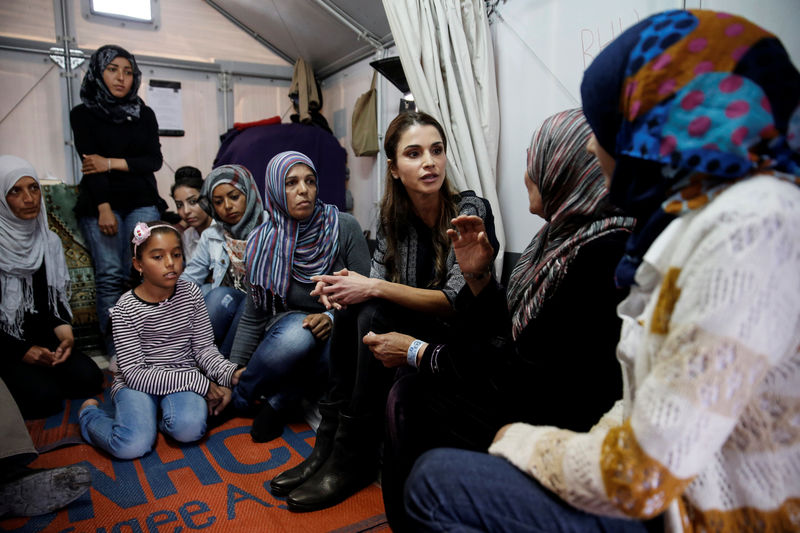By Stamos Prousalis and Alkis Konstantinidis
LESBOS, Greece (Reuters) - Queen Rania of Jordan met refugees at a camp on the Greek island of Lesbos on Monday in a visit to highlight the plight of people she said had "seen unspeakable horror and experienced unthinkable tragedy".
Scores of refugees and migrants clapped and cheered as she walked through the Kara Tepe camp, taking photographs and giving her notes.
They are among more than a million people fleeing conflict and poverty in the Middle East, Asia and Africa who have streamed into Europe since last year in the continent's biggest migration crisis since World War Two.
Jordan has accepted more than 630,000 Syrian refugees registered with United Nations High Commissioner for Refugees (UNHCR). Most of them are living in poverty outside the refugee camps, according to human rights groups.
"It is impossible to really understand the magnitude of the crisis until you come face to face with it," Rania told journalists after speaking with refugee women in the camp.
"These people have gone from suffering to suffering and the one thing I keep hearing time and again is that if they had a choice they would be back in their homes; that this was a last resort."
More than 4,000 refugees and migrants are living on Lesbos, most of them behind the barbed wire fence of a disused military camp.
About 850 people, mostly families, live in Kara Tepe, a municipality-managed site from which 12 refugees were flown out by Pope Francis last week after he visited the island.
Rania had been invited by the International Rescue Committee (IRC), an aid agency which has installed showers, toilets, laundry facilities and lights at the site.
To stem the flow of migrants and refugees arriving in Europe from Turkey on rubber motor boats, the EU and Turkey signed an accord in March under which those who arrive in Greece from March 20 and do not qualify for asylum will be sent back.
At the latest count, some 8,000 refugees and migrants on Greece's islands could be returned to Turkey if their asylum applications are rejected.
The deal has been criticised by human rights groups and the UNHCR, which say Turkey is not a safe country for refugees and who question whether the deal is legal or moral.
"This is a crisis about human beings, not about borders and barriers. It is about human dignity, not about deals," Rania said.
Part of the U.S.-led coalition that is bombing Syria, Jordan has long been praised for helping refugees and has been a big beneficiary of foreign aid as a result.

But it has also drawn criticism from Western allies and the UNHCR over the situation near its border with Syria, where thousands of refugees are being kept far from any aid.